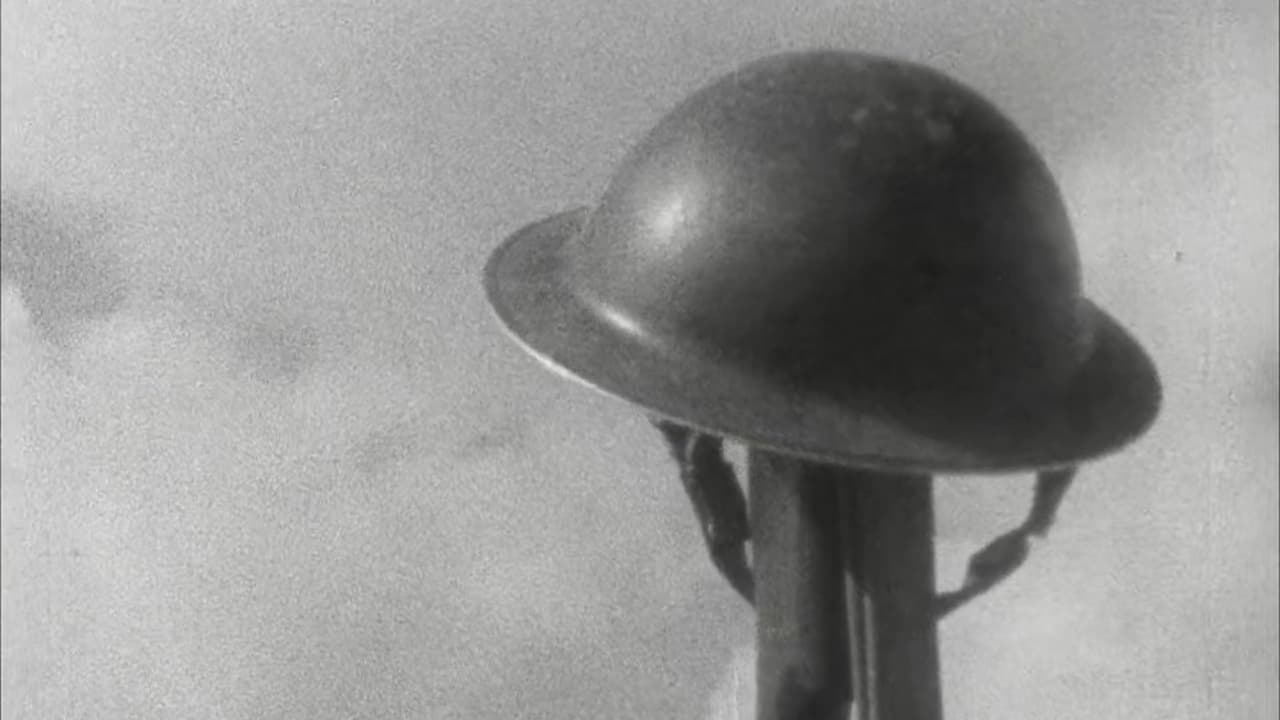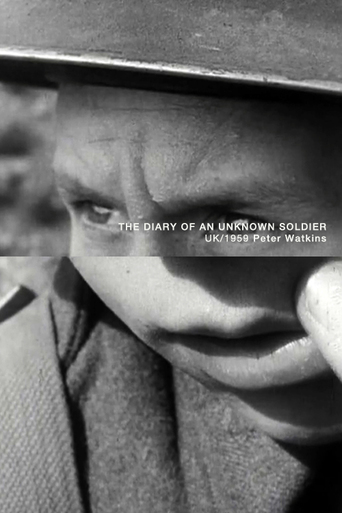Theo Robertson
Peter Watkins is one of the most radical and visionary film makers to have ever come out of Britain . He was the pioneer of the " docu-drama " before the term came in to popular usage . After seeing his famous BBC docu-drama CULLODEN I decided to revisit his Oscar winning documentary THE WAR GAME and his only attempt at a mainstream hit feature film PRIVILEGE from 1967 . Make no mistake Watkins is a great visionary and a very interesting director . The downside is that his work is often spoiled by massive overstatement which is like being locked in a room with someone who has over dosed on polemical political Prozac . He's anti-war , anti-military , and anti-establishment . If you're watching a film called THE DIARY OF AN UNKNOWN SOLDIER written and directed by one Peter Watkins you might just be able to second guess the style and content of it It's set during the First World War and revolves around a new recruit in the British Army about to fight his first battle . There's no dialogue from the characters and the story is told via the spoken thoughts of the unnamed lead . Watkins provides the voice of this character and that's a major failing right there . Whatever the talents of Watkins as a director he's not an actor . In fact I've got to be brutally honest and say the posh BBC newsreader type tone of Watkin's voice ends up dragging the whole production in to something unintentionally funny . I did state that the overdone solemn tone of CULLODEN ended up resembling BLACKADDER and here I was reminded of something that resembles a Great War version of a Monty Python sketch One other thing this earlier work shares with CULLODEN is an over reliance on close up . Okay I understand that budget is always a problem with a production like this hence we don't get a battle scene on a par with Lewis Milestones ALL QUIET ON THE WESTERN FRONT but the use of close up goes way beyond necessity . It was a running joke in classic DOCTOR WHO that no matter what planet the Tardis landed on it always resembled a quarry in Surrey and here the location might very possibly that very same quarry but we don't get to see it in any detail . Instead the screen is constantly filled with a close up of the protagonists frightened face . There is a segment where branches of trees are intercut with the fixed bayonets of the soldiers so it does indicate a creative imagination on the part of the director but as directorial technique goes this film is schizophrenic to say the least All this is a shame because no matter what you can't help coming away from a Watkins film with very strange mixed feelings and none of these feelings are indifference . Even if you didn't like the film you've just seen you get a compulsion to seek out Watkin's other works which are often obscure and very difficult to find and the reasons his work is obscure and difficult to find is probably the same reason why you want to seek it out
meddlecore
This film follows a young soldier, who has been sent to France to fight in WWI, on the last day of his life. The date is 1916. Watkins uses his reanactment documentary technique to show things as the boy will see and hear them. Watkins himself narrates, taking on the voice of the boy. This shows how war transforms boys into men. The boy is not much older than 18, while the narration, which is voicing the inner thoughts of the boy, is that of a man's voice.When the sound of mortars disturb the perfect morning atmosphere he begins to contemplate whether the other men in his unit feel the same fear as he does; the fear that they are marching to their deaths. He wishes he could seem cool calm and collective like the other men. He attempts to escape the reality of the situation, and comfort himself, by thinking about the humorous qualities and characteristics that the other men exhibit. But the fear returns when he thinks about his superior officer who loves war, and is ignorant to the death and destruction that it causes.At this point we enter his mind. Watkins uses a soviet montage to show his distraught. His fears exasperate to their peak, as he thinks of his own fate which is soon to come. Watkins jumps from battle scenes of soldiers warring, to shots from the soldier's perspective, and zoom-ins on the eyes of the soldier. This montage is effective in creating a feeling of extreme fear, excitement and anxiety, similar as what those in battle would have felt. VICTORY! Those still alive and whole cheer for the 200 km of dirt and mud that is their spoils. Those who are dying though do not cheer. This is how he envisions himself to die.He sits and waits. Waiting for the runner to come with the order to go to the front; writing to pass the time. He starts to get hope- a hope that the runner won't come with the order. But as soon as this hope arises it is destroyed as the runner comes with news. He once again wonders what the other men are thinking- if they feel the same tension as he is feeling. He wonders if his commanding officer is really as hard as he says he is, or if it is all a façade. And if the veteran Tom has any fear at all.It is now time to go to war. With rifle and bayonet in hand, and his helmet on his head, he realizes it is now time to become exactly what he was recruited to be. But he is still scared. We hear his thoughts as he discusses how he must suppress his feelings- as it is a soldier's duty- as well as about the various tolls that fear is taking on his body and mind. Watkins style of expressing the soldier's most internal feelings can be compared to the later work of Dalton Trumbo in his film "Johnny Got His A Gun".He looks to the veteran soldier Tom for support, to help ease his fears. But Tom offers none. He doesn't know why, but thinks that perhaps Tom is just as scared as he is. As the men begin to march toward the front, he sees the first German soldier that he has seen all war; an ordinary man, sitting and eating a bowl of soup. A man quite like himself, he thinks, just wearing a different uniform. This was one of the men they had been trained to hate and kill- yet he looks so harmless. He points out that the worst part of war is not that you have to kill men, but that you have to hate them, and keep hating all the while after. And as he and his comrades march off to the front, the film ends with the quote, "We are told, "what a tremendous thing it is to die for ones country"…Well tell it to those who do." This is an incredible film with a positive anti-war message. It does not demean or lay blame upon anyone, but rather allows us, as viewers, to voyeur into the mind of one of the young soldiers that is sent to fight our wars. This allows us to empathize with the character; and thus sends quite a powerful anti-war message. It is sad that today we see many war films made for the opposite purpose; to glorify war with hopes of indoctrinating young minds enough to get them to enlist - similar to the way the soldier, in this film, was rused into enlisting as a result of posters and propaganda.Watkins docu-drama style never ceases to entertain. The montages he uses in this film are eye-appealing and effective in creating the message and mood that was desired. His dominant use of close-ups allow us to create an intimate connection with the character, as we voyeur into his life and mind. Watkins' use of angled shots, in the montages, and perspective shots looking into the sky, is also an effective technique in that it gives the viewer a sense of the disillusionment that is felt by soldiers, especially those as young as the one we focus on.It is essential that films like this and Watkins other films become recognized, not only for their artistic merit, but also for their messages! I myself consider Watkins an "activist" director whom is making an invaluable contribution to, not only film, but also to global society. If we are to progress towards global peace, films like Peter Watkins "Diary of an Unknown Soldier", as well as his other films, and films such as "Johnny Got His Gun" and "All Quiet on the Western Front", MUST become glorified for the amazing power that they possess. The power to spread the message of peace. A definite 10 out of 10!

